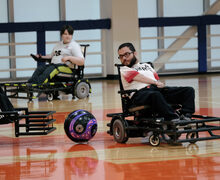Majors, minors introduced for the 2011-12 academic year
New majors and minors approved by the University Senate during the past year will be available for the 2011-12 academic year.
Beginning this fall, students can pursue an education major that dually certifies them in health and physical education in New York, said Sandra Bargainnier, coordinator of the physical education program.
Health and physical education is a new major offered in the School of Education this fall, Bargannier said. SU originally had a physical education major, but it was revamped during her three years with the program, she said.
SU is now one of three colleges in New York that offer the degree for dual certification in the state, Bargainnier said. Canisius College and Adelphi University also offer similar degrees, according to their respective websites. No State University of New York schools offer dual certification in health and physical education, Bargainnier said.
‘The major gives K-12 certification in both health education and physical education,’ she said. ‘It’s tough to get dually certified in New York.’
The health and physical education major is ‘rigorous,’ with 16 credits of lab science required, but it is a good degree to obtain in a competitive job market, Bargannier said.
A new minor in disability studies is available through the School of Education starting this fall. The 18-credit minor ‘applies social, cultural, historical, legal, philosophical and humanities perspectives to understanding disability in society,’ according to the disability studies website.
The newly named David B. Falk College of Sport and Human Dynamics will offer a sport hospitality and event management minor this fall, said Carol Roy, the internship placement coordinator at Falk.
The minor is open to students who have a 3.25 GPA and have completed 30 credits at SU, Roy said. The minor brings a focus to event planning that people do not often think of when attending events, she said. Some classes for the minor give hands-on experience in event planning, she said.
An information technology, design and startups minor was approved for the School of Information Studies last spring and will be available this fall to all students regardless of major, said Dave Molta, director of the information management and technology program at the iSchool, in an email.
‘IDS is a great example of cooperation between schools,’ Molta said.
The minor does not require advanced technology classes, but it has a goal of creating student ventures, Molta said. He said students will develop ideas in IDS courses, learn how to turn them into ventures and possibly land a space in the Syracuse Technology Garden, where they can work on their venture under the direction of the entrepreneur in residence.
The College of Arts and Sciences is now offering an applied mathematics major that enables students to earn a Bachelor of Arts or Bachelor of Science degree, said Mary Lerner, assistant dean for communications and public relations for Arts and Sciences, in an email. The program requires students to develop a background in science, economics or engineering, Lerner said.
A new integrated learning major, energy and its impacts, has also been introduced by Arts and Sciences this year, Lerner said. An integrated learning major is a program in which a student fulfills the requirements of an independent major along with the requirements of the integrated learning major, she said.
Medical anthropology, a new minor in Arts and Sciences, is designed to introduce undergraduate students to the field and prepare them for applied work or research in global health, Lerner said. The minor is appropriate for students pursuing degrees in the health sciences, international relations or other social sciences, she said.
Proposals for new majors and minors are processed by the Senate Committee on Curricula each month, said Barbara Kwasnik, chair of the committee, in an email. They are then presented for approval at a monthly USen meeting, Kwasnik said.
‘It is not always easy for students to discover different majors and minors because it is difficult to display them all in one place,’ she said.
Kwasnik said it is important that students utilize planning and advising so they do not miss any requirements to fill.
She said: ‘Plan ahead, get advising, but stretch out and use your own initiative to take advantage of an incredible array of courses and programs.’
Published on August 22, 2011 at 12:00 pm
Contact Breanne: [email protected] | @bre_vann




